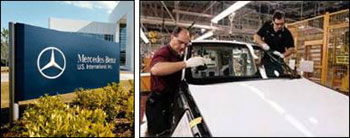NORTH AMERICAN
AUTOMOTIVE INDUSTRY
AUTOMOTIVE INDUSTRY

|
| "The analysts said it was not going to work," said Bill Taylor, president of Mercedes-Benz U.S. International, at a recent industry conference, talking about the company's 1993 decision to build a plant in Tuscaloosa County, Ala. "Now we're at 1.1 million vehicles." |
Meanwhile, Back Down South ...
Not all is bright for DaimlerChrysler. Witness the company's 8,500 job cuts coming to its Mercedes Car Group in Germany, cuts expected to cost as much as $1 billion. At the same time though, Mercedes Benz U.S. International (MBUSI) is still going strong in Alabama, said Bill Taylor, president of MBUSI, at a November conference hosted by Rockwell.
"The analysts said it was not going to work," Taylor said of his company's 1993 decision to choose Tuscaloosa County from the 150 sites it had evaluated. "Now we're at 1.1 million vehicles. Strategically we were trying to create a learning-from-within strategy. To do that we brought together many different cultures to create a melting pot of new processes. German, North American and Japanese ways melt together to create a learning field for our company. It's a work still in process."
What the company has found in Alabama, said Taylor, was an unmatched sense of partnership and commitment on the part of local and state government, strong support from the business community and a very valuable organization called AIDT, Alabama Industrial Development Training — "They've done just a fantastic job," Taylor said. The honeymoon's over now, said Taylor, but the remarkable sincerity the company felt from the area still lingers. So does the inviting investment climate
"We now have over 3 million square feet [278,700 sq. m.] under one roof," he said, noting an investment of more than $1 billion and the success of its 35 neighboring suppliers. "That was our concept from the beginning — everybody sits under the same roof — and we've been able to maintain that philosophy."
It's a philosophy that allows room for 4,000 employees, as well as 6,000 at the supplier operations, literally creating a small town's worth of workers from a small-town area. The ties that bind are strong: Taylor lauds the complex's one-percent turnover and 99-percent attendance figures. That sense of family — plus about 800 robots — is exactly what enables the operation to be on the brink of producing a family of vehicles on four different platforms, as suppliers like Rockwell and others work side by side with Mercedes-Benz employees.
The supplier spinoff just keeps spinning: In November, Brose Tuscaloosa, the door system supplier to the Mercedes-Benz plant, announced a $5-million, 38,000-sq.-ft. (3,530-sq.-m.) expansion that will add 72 new jobs eventually — but it's caused by a contract for another OEM, which the company said would be announced in 2006.
Clear Lessons
MBUSI's focus on people and standardization makes learning all the more important, and while existing training is strong, Taylor admitted to some difficulty on the recruiting end, due to cultural misperceptions about manufacturing: "This is my second plant to start up," he said, "and there are interesting similarities between Canada and Alabama. We are not well-connected with the education system in the business community."
Finding little orientation to skilled-trades jobs in high schools, the company created its own apprenticeship program, based on a three-year program in Europe.
"It's evolved into a high-school-to-work program in the U.S.," he said, "a two-year program in grades 11 and12, with 50 percent of time in the training center, 50 percent in class, geared toward us and our suppliers. Companies have to grow manufacturing by getting more integrated with the school systems — I'm surprised at times by how far apart we are."
The interest in education extends to the current work force too, says Taylor, as increased operational transparency brings with it an increasingly transparent view of how the business works.
"Our approach is to talk openly about job security and what that means — safety, quality and efficiency to survive in this competitive world. To our credit in our industry, typically in the really bad times, we get better fast. In the 1970s we had gasoline problems, and we quickly shifted gears and found our way through that. That's the challenge of management."
The gear-shifting needs to come even quicker now: Taylor says the measurable return on investment is looked at in a time frame that's "half or less than what we used to look at three to five years ago."

